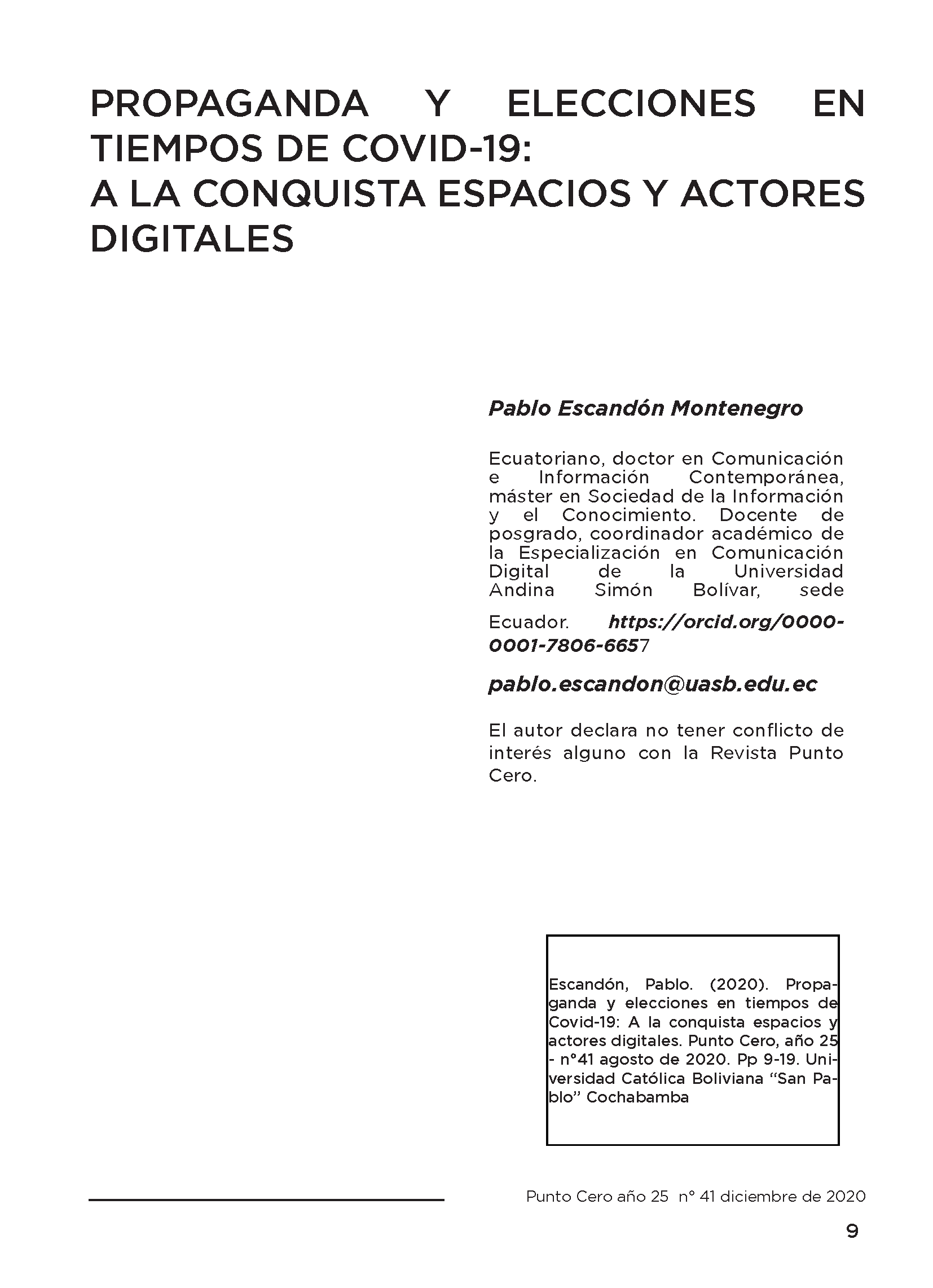Propaganda and elections in Covid-19´s times: To conquer digital spaces and actors
DOI:
https://doi.org/10.35319/puntocero.2020211Keywords:
Propaganda, Elections, Covid-19, Digital communicationAbstract
In the last quarter of 2020, elections will be held in the American continent: Bolivia in October, the United States in November and Ecuador, which will start the campaign in December. All signed under the health emergency, which caused isolation, the deepening of economic crises and in the Bolivian and Ecuadorian case, the deepening of political crises. How do electoral campaigns unfold in these settings? How will democracy and media strategies be challenged to move and convince younger and younger voters with different media practices? Technopolitics and digital communication are linked to the defense of social rights to excite the electorate that moves in media scenarios and on digital and mobile community platforms and that respond to causes and challenges, mediated by influencers.
References
ARAN-RAMSPOTT, Sue; FEDELE, Maddalena; TARRAGÓ, Anna (2018). Funciones sociales de los Youtubers y su influencia en la preadolescencia. En: Comunicar, 57, 71-80. https://doi.org/10.3916/C57-2018-07 DOI: https://doi.org/10.3916/C57-2018-07
BERZOSA, Millán (2017). Youtubers y otras especies. El fenómeno que ha cambiado la manera de entender los contenidos audiovisuales. Madrid: Ariel-Fundación Telefónica.
CASTELLS, Manuel. (1996). La era de la información. Vol.1 de La sociedad red. 2da Ed. Madrid: Alianza.------------.2012. Redes de indignación y esperanza. Los movimientos sociales en la era de Internet. Madrid: Alianza.
DURÁN BARBA, Jaime y NIETO, Santiago (2020). ¿Y dónde está la gente? Buenos Aires: Debate
EL MERCURIO (2020). “El reparto de mascarillas con logo de una candidatura desata críticas”. https://ww2.elmercurio.com.ec/2020/03/04/el-reparto-de-mascarillas-con-logo-de-una-candidatura-desata-criticas/. Consultado el 22/09/2020.
ESCARPIT, Robert (1992). Teoría de la información y práctica política. México: Fondo de Cultura Económica.
FERNÁNDEZ, José Luis (2016). Plataformas mediáticas y niveles de análisis. En: Inmediaciones de la Comunicación, 2016, Vol. 11. DOI: https://doi.org/10.18861/ic.2016.11.11.2618 DOI: https://doi.org/10.18861/ic.2016.11.2618
GUTIÉRREZ RUBÍ, Antoni y PONT SORRIBES, Carles (eds.) (2020). Comunicación política en tiempo de coronavirus. Barcelona: Cátedra Ideograma UPF.
IGARZA, Roberto. 2009. Burbujas de ocio: nuevas formas de consumo cultural (1ª ed.). Buenos Aires: La Crujía.
INNERARITY, Daniel (2020). Una teoría de la democracia compleja. Gobernar en el siglo XXI. Barcelona: Galaxia Gutenberg.
JENKINS, Henry (2009). Fans, blogueros y videojuegos. La cultura de la colaboración. Barcelona: Paidós.
LA VANGUARDIA (2020). “El reparto de mascarillas con logo de candidatura desata críticas en Bolivia”. https://www.lavanguardia.com/politica/20200303/473956026892/el-reparto-de-mascarillas-con-logo-de-candidatura-desata-criticas-en-bolivia.html. Consultado el 22/09/2020.
LEVOYER, Saudia y ESCANDÓN, Pablo (2018). “Elecciones en Ecuador: Internet pensado como tuberías” en Comunicación en el siglo XXI. Una mirada regional. Quito: UIDE.
LÓPEZ-GARCÍA, Xosé y CAMPOS-FREIRE, Francisco (eds.) (2015). Journalism in Change. Porto: Media XXI.
MAAREK, Philippe J. (2009). Marketing político y comunicación. Claves para una buena información política. España: Paidós
PERRIN, Andrew. y ANDERSON, Monica (2019). “Share of U.S. adults using social media, including Facebook, is mostly unchanged since 2018” en Pew Research Institute, consultado el 29/01/2020 de https://www.pewresearch.org/facttank/2019/04/10/share-of-u-s-adultsusing-social-media-including-facebookis-mostly-unchanged-since-2018/
SCOLARI, Carlos. (2008). Hipermediaciones. Elementos para una Teoría de la Comunicación Digital Interactiva. Barcelona: Gedisa.
SANTOS, Milton (1995). Metamorfosis del espacio habitado. Barcelona: Oikos.
STRACQUALURSI, Veronica y MUCHA, Sarah. (2020). CNN https://edition.cnn.com/2020/06/26/politics/joe-biden-masks-mandatory-coronavirus/index.html. Consultado el 22/09/2020.
VAN DIJCK, José (2016). La cultura de la conectividad: Una historia crítica de las redes sociales. Buenos Aires: Siglo Veintiuno Editores.
VAN KESSEL, Patrick (2019). “10 facts about Americans and YouTube” en Pew Research Institute, consultado el 29/01/2020 de https://www.pewresearch.org/fact-tank/2019/12/04/10-factsabout-americans-and-youtube/

Downloads
Published
How to Cite
Issue
Section
License
Copyright (c) 2020 Revista Punto Cero

This work is licensed under a Creative Commons Attribution-NonCommercial 4.0 International License.








